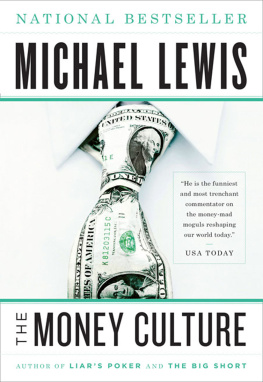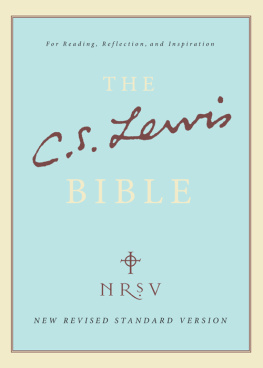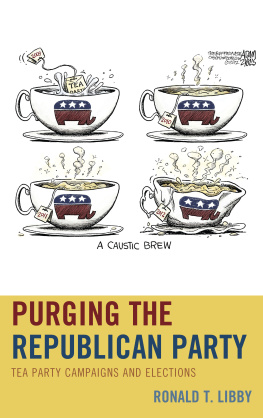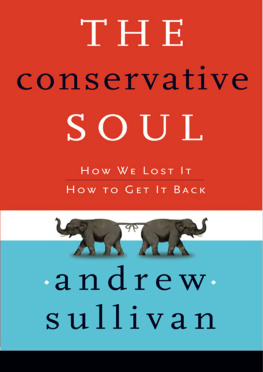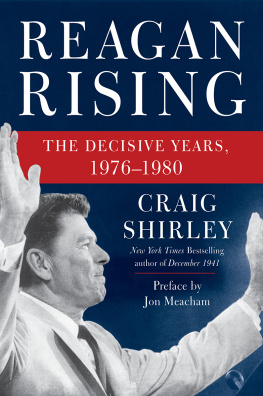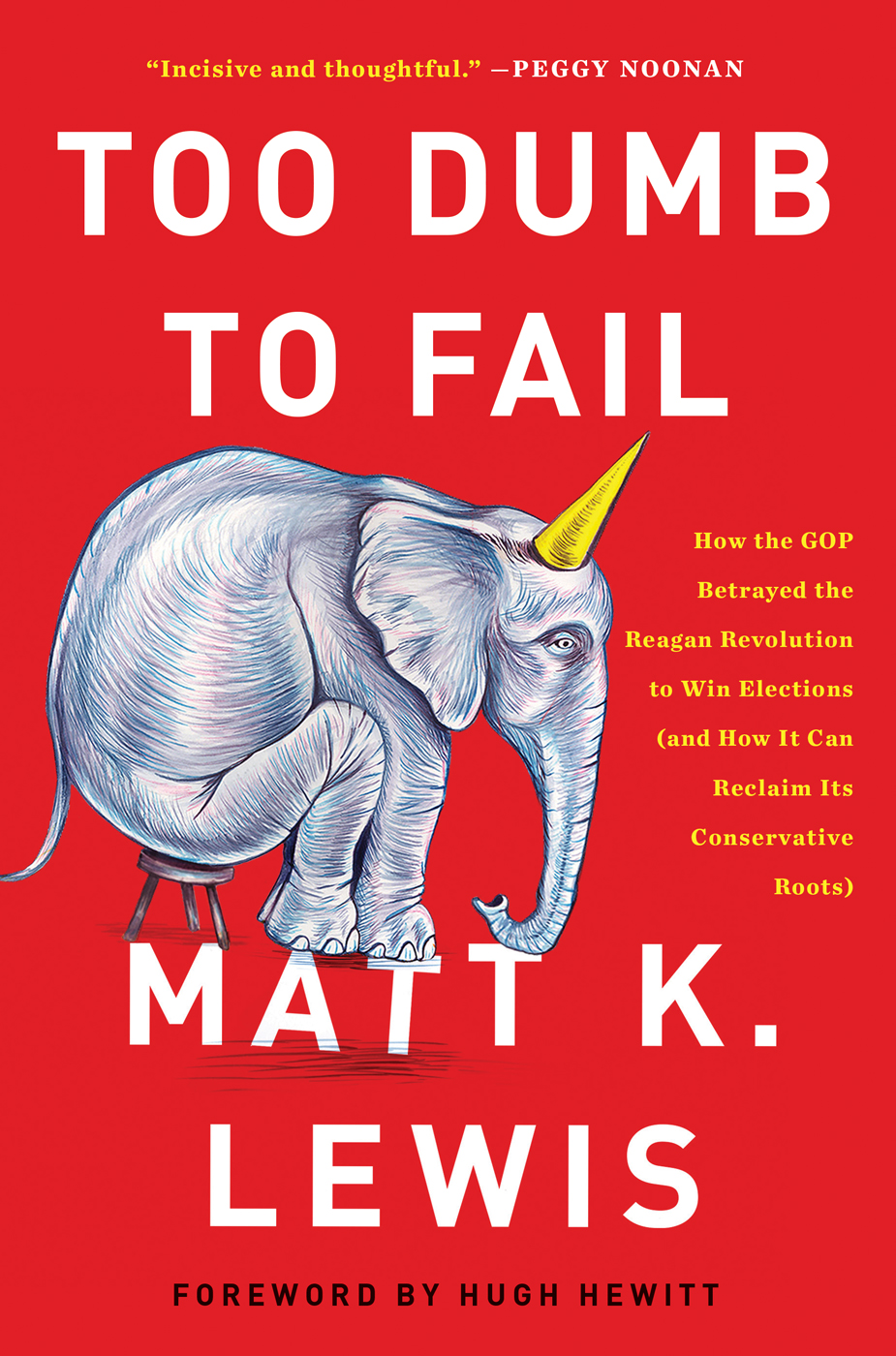Thank you for buying this ebook, published by HachetteDigital.
To receive special offers, bonus content, and news about ourlatest ebooks and apps, sign up for our newsletters.
Copyright 2016 by Matt K. Lewis
Cover design by Rebecca Lown
Cover illustration by Robert Karl Blake
Cover copyright 2016 by Hachette Book Group, Inc.
All rights reserved. In accordance with the U.S. Copyright Act of 1976, the scanning, uploading, and electronic sharing of any part of this book without the permission of the publisher constitute unlawful piracy and theft of the authors intellectual property. If you would like to use material from the book (other than for review purposes), prior written permission must be obtained by contacting the publisher at permissions@hbgusa.com. Thank you for your support of the authors rights.
Hachette Books
Hachette Book Group
1290 Avenue of the Americas
New York, NY 10104
hachettebookgroup.com
twitter.com/hachettebooks
First Edition: January 2016
Hachette Books is a division of Hachette Book Group, Inc.
The Hachette Books name and logo are trademarks of Hachette Book Group, Inc.
The publisher is not responsible for websites (or their content) that are not owned by the publisher.
The Hachette Speakers Bureau provides a wide range of authors for speaking events. To find out more, go to www.hachettespeakersbureau.com or call (866) 376-6591.
Library of Congress Cataloging-in-Publication Data
Names: Lewis, Matt K., author.
Title: Too dumb to fail: how the GOP betrayed the Reagan revolution to win elections (and how it can reclaim its conservative roots) / Matt K. Lewis.
Description: First edition. | New York: Hachette Books, [2016] | Includes bibliographical references.
Identifiers: LCCN 2015039421 | ISBN 978-0-316-38393-6 (hardcover) | ISBN 978-1-4789-6095-9 (audio download) | ISBN 978-1-4789-1043-5 (audio cd) | ISBN 978-0-316-38391-2 (ebook)
Subjects: LCSH: ConservatismUnited StatesHistory. | Republican Party (U.S.: 1854 ) | ElectionsUnited StatesHistory. | Political campaignsUnited StatesHistory.
Classification: LCC JC573.2.U6 L49 2016 | DDC 324.2734dc23 LC record available at http://lccn.loc.gov/2015039421
E3
To Burke and Becket
Matt Lewis is going to make a lot of people angry with this book, especially those who profit from making people angry, especially those who pretend to be conservative activists but are instead plunderers of the poorly informed populist fringe. Lewis is out to save the conservative movement from itself, from its headlong rush into permanent frenzy. Along the way he holds up for praise those who are nursing the conservative garden while blasting away at the forces seeking to surround it with castle walls marked by heads on pikes and bristling with cauldrons of tar for anyone who draws close and isnt appropriately credentialed.
My own business of talk radio takes some shots in Too Dumb to Fail, many deserved, some wide of the mark, but in finding, for example, space to both praise Rush Limbaugh and knock him, Lewis is demonstrating the eye that has given him a unique space in the universe of center-right writers and commentators, the one reserved for those about whom it can be written, Respected on all sides.
Lewis is also a Christian, of the sort that doesnt tell you that very often, and so his comments on how the faith fares in the thirty-year war that is modern American politics are must reading. But so is the whole sharp, revealing, often-funny, never-dull assessment of Reaganism at the brinkwhether renewing or plummeting into historys abyss we will see.
Hugh Hewitt, October 2015
Wisdom is the principal thing; therefore get wisdom: and with all thy getting get understanding.
Proverbs 4:7
In September 2010, I took part in a conservative think tank panel discussion on the rise of a new phenomenon known as the Tea Partya loose-knit group of aspiring activists who previously were not engaged in the political process. In contrast to the other panelists, I argued that, while the entry of new activists and voters into politics was usually a welcome development, the characteristics that came to define the Tea Party posed significant challenges to the Republican Party: doubling down on anti-intellectualism, courting isolationism, and taking cues from amateurs who lacked experience and professionalism. My comments, though delivered in a tone I considered measured and thoughtful, evoked murmuring and at least a few audible gasps. The question hanging on the lips of many audience members was clear: Why wasnt a conservative writer blindly cheerleading this seminal moment in conservative movement history?
One of the forums other speakers was an avuncular and sharp conservative leader who had worked for Ronald Reagan and George H. W. Bush, and he was now the head of an important conservative organization. At the event, he bristled at my remarks. Thats just what people said about the Christian Coalition in the 1980s, he charged, winning the crowds approval.
A few days later, while direct messaging with one of his aides on Twitter, I learned the truth. He agreed with everything you said, the aide confided. He just thought it was foolish to say so out loud.
This is the dirty little secret of the conservative movement in America today: everyone knows that it has lost its intellectual bearings. Empty-headed talking point reciters, rookie politicians whove never managed anything in their lives, media clowns such as Donald Trump, dim bulbs in tight pants or short skirts, professionally outraged shout-fest talking heads, and total political neophytes dominate conservative airwaves and the Rights political discourse.
It wasnt always like this. A half century ago, the presidential candidacy of Barry Goldwater was nearing a disastrous end. Lyndon Johnson, Goldwaters Democratic opponent in the 1964 election, had bludgeoned the Arizona senator as a conservative extremist who would recklessly start a nuclear war. Trailing in every poll with time dwindling, Goldwaters supporters (led by an auto dealer named Holmes Tuttle) decided to spend a small fortune for thirty minutes of TV airtime. To make the case for Goldwater, they chose a former actor and Screen Actors Guild president named Ronald Reagan. Officially titled A Time for Choosing, the spot became known simply as The Speech. The story of how it came to be is interesting. Reagan (who was then serving as cochairman of Californians for Goldwater) traveled the state, stumping for his candidate. After addressing a fund-raiser in Los Angeles, Reagan recalled that he was approached by a delegation of high-powered Republicans who asked if he would deliver the speech on TV if they funded it. I said yes and suggested that, instead of just having me in a studio alone, they bring in an audience to get a little better feel, he recalled.
Reagan began his address by remarking that he had chosen his own words and would be discussing his own ideas. Back in 1964, neither of those facts was especially startling. Political speakers frequently wrote Of course, he did. But The Speech also helped raise millions of dollars for Goldwaters campaign. And, of course, it ultimately served as the catalyst that would make Ronald Reagan the president sixteen years later.


